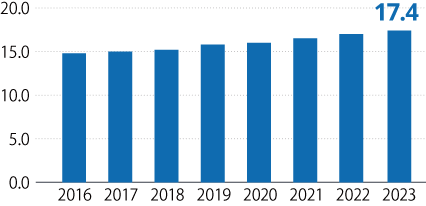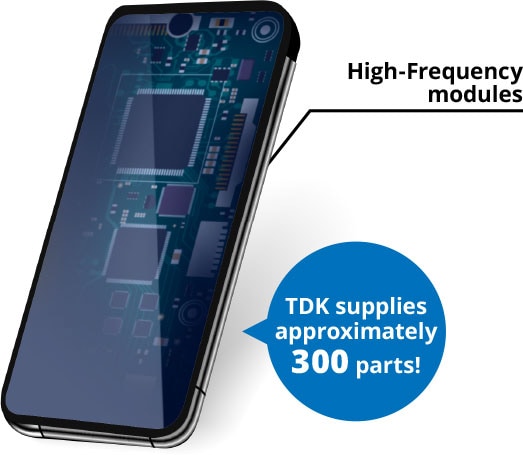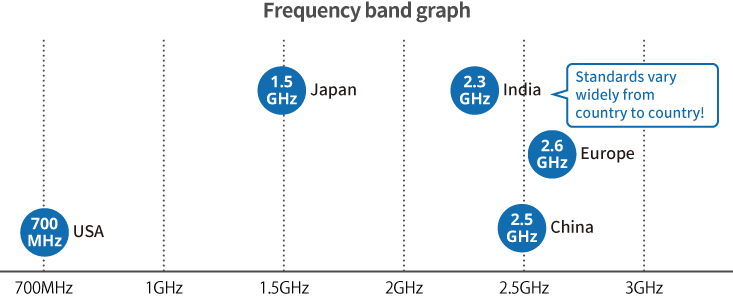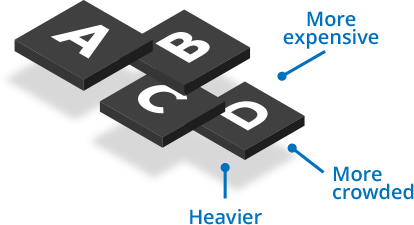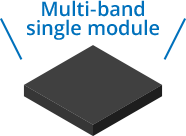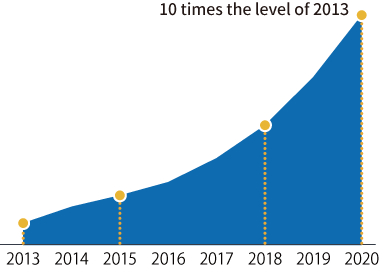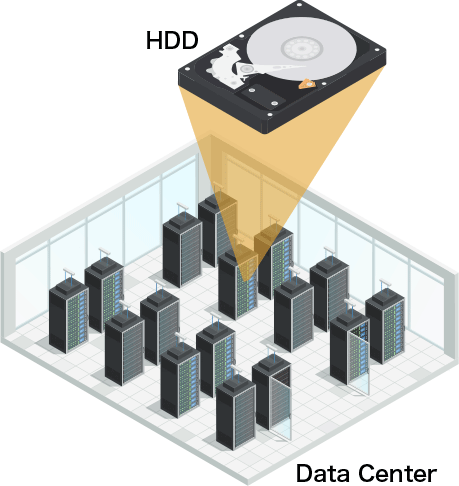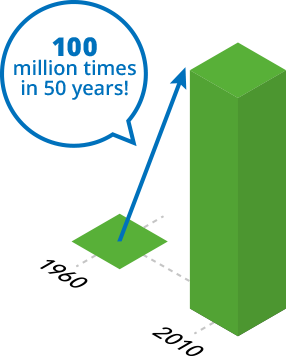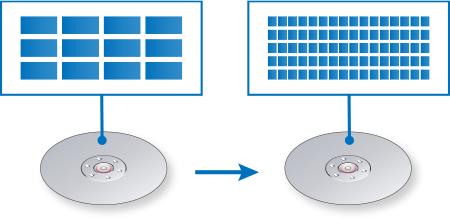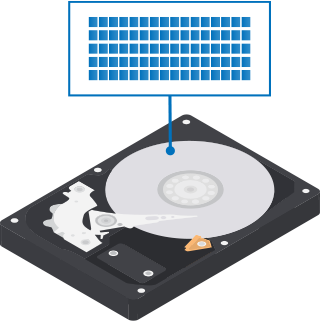Growth Strategies
ICT
Continued Stable Growth in the Smartphone Market
Electronic component demand continues to expand, driven by market growth and increasing sophitication and functionality of smartphones.
- Source: Fuji Chimera Research Institute, Inc. "Worldwide Electronics Market 2018 & Comprehensive Study"
Smartphones are creating a new culture of mobile connectivity. And they use lots of different components made by TDK!
TDK's multilayer chip components are significantly helping to reduce the size and weight of mobile devices.
Many types of noise suppression components made by TDK are also in widespread use, ensuring high-quality, high-reliability data transmission.
TDK supplies approximately 300 parts!
- Multilayer ceramic chip capacitors
- Multilayer chip inductors
- SMD power inductors
- Band-pass filters
- SAW filters
- In-case antennas
- Thin-film common mode filters
- Multilayer chip varistors
- Noise suppression sheets
With the new LTE standard in mobile network technology, RF modules for multi-band mobile phones show great potential!
LTE (Long Term Evolution) is a next-generation standard in mobile network technology that will enable download speeds of up to 75 Mbit/sec. The problem is that many different standards currently exist for frequency bands from country to country and carrier to carrier.
This situation requires manufacturers targeting the global mobile phone business to comply with a wide range of differing standards. Mounting components accordingly leads to many problems, such as higher costs, greater space requirements, and heavier phones.
To address this, the market needs high-frequency modules for multi-band mobile phones, where a single module can handle a range of different radio frequencies. TDK-EPCOS is strong in this area and is developing new products to meet these needs.
TDK leads the way in increasing the capacity of hard disk drives through the development of magnetic heads using advanced thin-film processing technologies.
Nanotechnology is employed to control manufacturing at the level of one-one millionth of a millimeter.
HDD heads are manufactured using advanced thin-film process technologies.
TDK's newly developed "thermal-assist" technology will usher in the age of one-terabyte hard drives for notebook computers.
- HDD
Neodymium magnets for VCMs - Power supply line
Power supply inductors - Signal line
Multilayer ceramic capacitors,Multilayer chip inductors,Ferrite beads - Interface
Common mode filters
Rapid increase of power consumption by data centers with expansion of data centers market to store explosive growth of data volumes handled on internet.
Projected Data Generation World Wide (TDK estimate)
Global data volumes are expected to increase dramatically going forward.
Demand for high capacity storage will continue to increase in line with increased recording capacity.
With wide range of storage products utilizing TDK's advanced technology, TDK offers various solutions for higher speed and lager capacity in data communication and contributes to energy savings at data centers.
TDK is working harder to provide comprehensive solutions corresponding to higher speed, lager capacitys and energy savings for data centers with state-of-the-art technology such as thermal assist technology.
Support for higher speeds and larger capacity
- HDD head/suspension
Achieved world’s highest recording density. - VCM (voice coil motor) magnet
New magnet for head drive motor significantly reduces dysprosium consumption - Optical communication cable
Changing data center internal wiring to optical fiber.
Contribute to energy savings
- Front-end power supply
Improve power usage efficiency. - Bidirectional DC-DC converter
Low-loss power conversion allows efficient use of power from backup battery. - Compressor magnet
More efficient air conditioning systems.
A breakthrough in increasing hard disk capacity An entirely new way of recording. TDK's "thermal-assist" technology boosts the capabilities of a hard disk drive's magnetic head!
Advancements in computer hard disk drives are taking place at a remarkable speed, with capacities increasing at an accelerating pace. In the last 50 years, capacities have increased 100 million times!
How can the data recording capacity of the disc (platter) shoot up without a change in disc size? The answer lies in the miniaturization of the tracks (recording units) for writing data, which means greater recording density.
When the approaching limits of miniaturization started to become clear, TDK began working on a perpendicular recording method to replace the horizontal system that had always been used. In 2005, TDK succeeded in commercializing the world's first perpendicular recording method.
However, limits started to appear in the perpendicular recording method as demand for higher data recording capacity continued to grow. TDK then began working to develop magnetic heads for hard disk drives that use an entirely different approach: thermal-assist magnetic recording.
The day is not far off when surface recording density will exceed one terabit per square inch in a hard disk drive.


